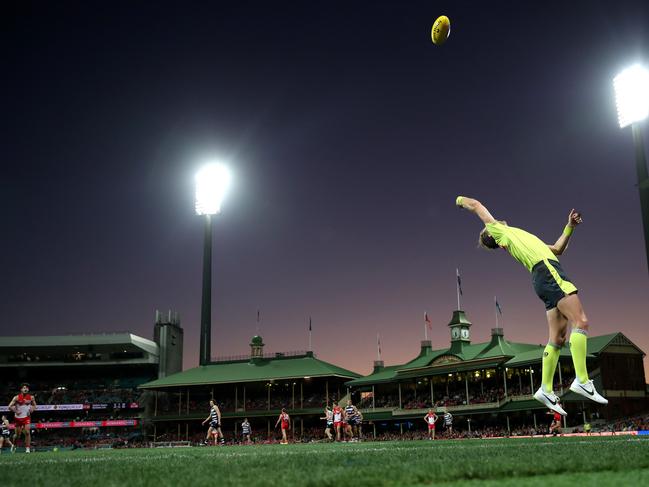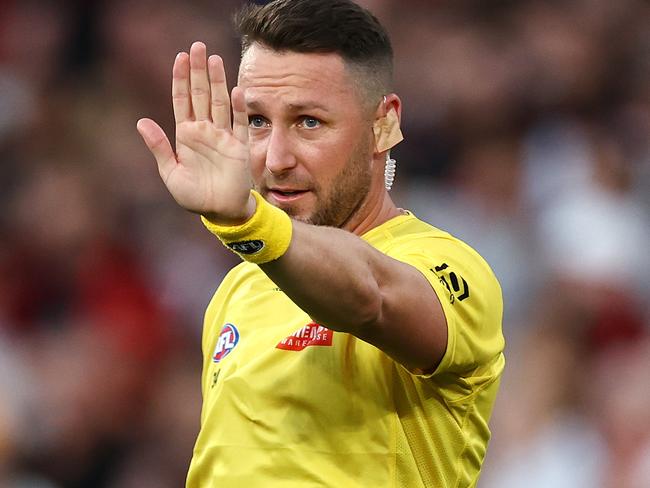Mick Malthouse’s fear: Fans will abandon game if AFL doesn’t fix frustrating rules
From the stand rule to 6-6-6 and nominating rucks, Mick Malthouse believes the AFL has tinkered with the rules too much and it is already keeping fans away from the game. Here’s his plan to fix it.

AFL News
Don't miss out on the headlines from AFL News. Followed categories will be added to My News.
With a chill in the air, it sure feels like footy weather.
What a pity.
Watch every blockbuster AFL match this weekend Live & Ad-Break Free In-Play on Kayo. New to Kayo? Try 14-Days Free Now >
After two years of Covid the AFL intended to break all sorts of crowd records in round 1. While the numbers were strong early, it hasn’t remained that way, with only a few big crowds – 84,205 for the Anzac Day clash – scattered among declining numbers.
So why the reluctance by supporters to attend games?
I’m convinced there is a real frustration with the rules. It’s not the game we are used to. By over-officiating we are eliminating some of the best features of Australian rules football and heaping unnecessary pressure on the umpires.

Stand still on the mark
This rule makes the umpire stand out for all the wrong reasons. How can we justify giving the player with the ball full advantage with 18 active players, while the lamppost in front of him has to rely on his 17 teammates to defend?
There have been many instances where the umpire has neglected to call play-on and the man on the mark has been left standing embarrassingly still while play goes on around him.
It takes away instinct, which is what our game is famous for.
If we simply go back to the rule which states that if the defender crosses the mark before the play-on it is a 50m penalty, then it allows him to at least guard the mark and be at the ready to chase and tackle.
This former option could easily be reinstated as it was never a real problem for the umpires to adhere to. Perhaps most frustrating about the current rule is that it is interpreted differently by each umpire.

Nominating the ruckman
The rule is quite clear: no third-man-up in a ruck contest. So why do we need to ask who is contesting the ruck? Surely teams can co-ordinate that for themselves. Let’s take another unnecessary burden off the umpires and allow them to throw it up, and if there’s an infringement, it’s a simple free kick for the opposition.
Throw-ins
Surely the most important job of the boundary umpire is to collect the ball and throw it in correctly over his head towards the centre of the ground. Why on earth then are we waiting for the rucks to get into position, while they take their leisurely time do so?
Nowhere in the rules does it say we must wait for the rucks to position themselves. It will shave minutes off the game and ease congestion at the stoppages, if the umpire – who is very good at being in position quickly – throws it in immediately. When the ruckmen know this, they will move a lot faster.

Kick-ins from a behind
We have a goalsquare that is perfectly big enough for a player to bring the ball back into play without giving him an extra 15m.
As it currently stands it is a free stat for the player with the ball, who can play-on around his mannequin opponent and run a decent distance before he disposes of the ball. Why are teams being penalised for kicking a point?
The former rule stated that the man-on-the-mark stood 5m from the top of the goalsquare and the kick-in player couldn’t cross the line before bringing boot to ball.
It promoted the use of “kick-in artists” with a beautiful drop-punt straight to a target, or at the very least a big marking contest, which supporters love.
6-6-6 rule
Today’s coaches come under massive scrutiny from the media, supporters, and their club boards. But are they even allowed to coach anymore? There is such a decline in match-day involvement by the senior coach due to several rules.
The runner is restricted by the number of times he is allowed on the ground. That’s OK, but it significantly reduces immediate communication between the coach and players.
The 6-6-6 rule works for junior football only, after that it undermines the coach and leaves him hamstrung for tactics to defend a lead or overturn one.
Let the coach’s coach. If he chooses to put a man behind the ball, then let the opposing coach counter it. Let’s see theses coaches go to work.
The greatest coaching moment is the ability to resurrect a game through the deployment of your players.
Not many AFL grounds are still influenced by the wind, but there are some. I always found it intriguing how coaches could combat a wind advantage. It made for a game of chess. But the 6-6-6 rule leaves them with little ability to do so now.

Umpire dissent
Brett Rosebury is the best umpire I’ve seen in 50 years of football. He brings common sense to the game, and a demeanour where players and coaches alike get on with him.
He is unannounced in a game and you rarely see players degrade his authority.
Subtle words calm stormy waters. He should be the template for all umpires.
AFL is about playing games for keeps so emotions will always be on show. If there’s a physical assault or an over-the-top remonstration with an umpire, he has every right to report the player or hand-out a 50m penalty.
The new rule is over the top and has created inconsistencies. And it won’t be too long before it costs someone a game. It puts the umpires in a very unfortunate position. Before, they had the power to call out dissent, now they have become targets of ridicule.
Where to now?
The new rules were implemented to supposedly speed up the game, open it up, and increase scoring. Instead, they’ve created angst for coaches, players, and supporters, and most-likely, umpires too.
We’ve battered our way through Covid – albeit that the West Australian clubs are still suffering from Mark McGowan’s late call – to have uncertainty around people attending games. A decline in the number of juniors participating in football. Umpires being scrutinised for doing what they are told to do. Coaches with no freedom to coach.
Players confused and disgruntled. And supporters bewildered.
We need our game returned to a style that people can relate to, enjoy, and barrack for. People don’t need an excuse to extend their habits of the last two years and stay home.
The sanitisation of the rules has had a massive impact on people falling out of love with the game. We need them to fall in love with it again. Return the pie and sauce to footy! (And allow cash to be used at stadiums, because how many children have debit cards?)
Right in front of us is a former player, a club administrator who has been to rock bottom and sky high. Brendon Gale could quite possibly be the game’s saviour, let’s hope the AFL Commission thinks so too.
More Coverage
Originally published as Mick Malthouse’s fear: Fans will abandon game if AFL doesn’t fix frustrating rules





